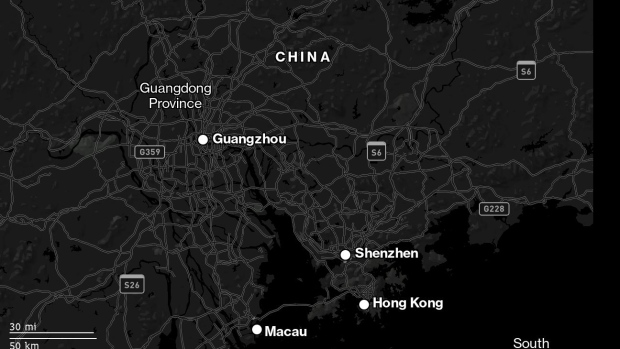Jun 15, 2022
China-Hong Kong Wealth Link’s Slow Start Blamed on Travel Limits
, Bloomberg News

(Bloomberg) -- Hong Kong’s highly touted wealth link with the Chinese mainland is being hampered by travel curbs that make it hard for new customers to meet bankers.
As of April, the program had attracted only 940 million yuan ($140 million), or about 0.3% of the total quota, since its inception in October. Marketing is restricted on the Wealth Management Connect scheme and strict quarantine measures make it difficult for bankers to travel in person in search of new business.
Banks such as Bank of China Ltd. and HSBC Holdings Plc have been building links to capture annual fees for the program estimated at around 3 billion yuan. The scheme offers cross-border investments in the Greater Bay area, a region of about 70 million people that includes Hong Kong and mega cities such as Shenzhen.
Banks are being hindered by the inability of customers to personally meet relationship managers, said Arnold Chow, deputy general manager, personal digital banking product department of Bank of China (Hong Kong). The Bank of China group has captured about 60% of the customers in the scheme as of March, he said, adding that he’s bullish on its long-term prospects.
“One of the very important enablers is the opening up of the cross border,” he said in an interview. “It’s cross border regulations, we are not able to solicit with the customers.”
The Wealth Management Connect link allows bank customers who are retail investors in nine southern Chinese cities to put money across the border in Hong Kong, and vice versa.
A total of 27,297 customers opened accounts to participate in the program as of April 30, according to People’s Bank of China data, representing roughly 9.1% of the 300,000 accounts that investment caps allow. The program has a total quota of 150 billion yuan each way and an individual quota of 1 million yuan.
Sally Wong, chief executive of the Hong Kong Investment Funds Association, says many investors in the Greater Bay area are most in need of investment advice, yet banks and money managers cannot proactively promote their services under the current rules.
“The gist is how to address the structural issues so as to unleash the potential of the scheme,” she said, adding that the program has “huge potential.”
There’s also the lingering pandemic impact, among a slew of other factors that helped contribute to the scheme’s slow takeoff. Hong Kong’s new leader John Lee said the city still faces hurdles to reopen the border with the mainland when he recently returned from his first meeting with President Xi Jinping since being selected to run the financial hub.
Recent lockdowns in mainland China may have dimmed hopes for the easing of travel restrictions with Hong Kong, said Bloomberg Intelligence analyst Sharnie Wong. The eventual reopening of the border could provide a much-needed boost for the Wealth Management Connect, she said. Its lackluster start has also coincided with equity-market turmoil that’s hampered sentiment, Wong said.
“Travel curbs between mainland China and Hong Kong have inevitably impacted cross-boundary business, including but not limited to Wealth Management Connect,” according to a spokesman at the Bank of East Asia, one of the banks participating in the link. “Re-opening the border will certainly encourage activity between Hong Kong and the mainland, and we expect an up-tick in cross-boundary business on the whole.”
‘Pool of Opportunities’
In a similar pattern seen with the equity and bond connect programs, Chow expects the development of Wealth Connect to be gradual and says he is optimistic about its long-term prospects. His firm’s Hong Kong customers are interested in mainland wealth management products such as structured products with fixed tenors, while mainland clients are keen on deposits and investment funds in Hong Kong, he said.
“The border now is still closed,” said Chow. “But when it opens, it’s a pool of opportunities.”
©2022 Bloomberg L.P.






